ASR- Brain Antomy knowtitall
1/26
There's no tags or description
Looks like no tags are added yet.
Name | Mastery | Learn | Test | Matching | Spaced | Call with Kai |
|---|
No analytics yet
Send a link to your students to track their progress
27 Terms
cerebrum
interprets your five senses
regulates conscious actions that require thinking (speech, memory, behavior, personality, movement, reasoning and judgment)
largest part of your brain, about about 85% of its total mass
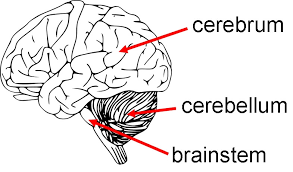
cerebrum is divided into 2 halves
left and right hemisphere
fiber bundles(white matter) called the corpus callosum connect the two halves
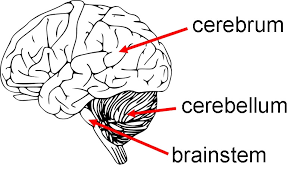
Brain Stem
regulates many automatic body functions(don’t consciously control)
heart rate, breathing, sleep and wake cycles, and swallowing…
in the lower part of your brain, connecting the rest of your brain to your spinal cord.
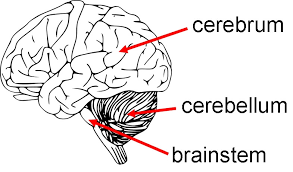
Cerebellum
coordinates fine motor skill movements
balance, posture, coordination…
small, half-circle shape that’s located in the back of your brain around your brainstem
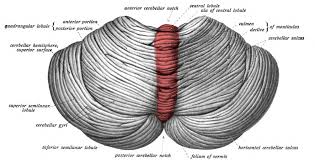
Cranium (is part of the skull)
Bony structure surrounding brain, cranium plus all the bones of the skull protect brain from injury
cerebrospinal fluid (CSF)
brain floats in this liquidy substance, also helps protect from injury
Tissues(3) between brain and skull
Dura Mater (outermost layer, lines your cranial vault)
Arachnoid membrane (middle layer has a thin layer of tissue that covers your entire brain)
Pia mater (innermost layer contains blood vessels that run into your brain’s surface)
How many cranial nerves does the brain have?
***Nerves carry messages by sending electrical impulses back and forth between your brain, organs and muscles
Your brain has 12 cranial nerves
What are the lobes(a major section of the brain's cerebrum) that make up the brain?
Where are they, what are their functions?
Frontal lobes
where? —> front part of your brain, behind your forehead (LARGEST lobe)
what? —> controls voluntary movements, social understanding, thinking and learning, and more
Occipital lobes (. )
where? —> the back of your brain
what? —> allows you to process and interpret visual information from your eyes
Pariental lobes (. )
where? —> upper back of your brain
what? —> receives + interprets signals from other parts of the brain allowing you to understand your environment and state of your body
Temporal lobes (. )
where? —> side of your head near your ears
what? helps you retrieve memories and understand language and emotions
Major Functional Systems
Motor system
Sensory systems
Autonomic nervous system (ANS)
Limbic system
(flashcards for each system…)
Gray vs. White matter in the brain
two tissues in your brain known as gray and white matter
Gray matter is the darker, outside section (the cerebral cortex) that helps you with your day-to-day functioning., like muscle control, using your senses, remembering something, experiencing emotions and speech.
White matter is the lighter section below the gray matter that sends signals to different parts of your central nervous system to help you function.
Glial cells
Nuerons
help maintain your brain, form myelin (a fatty, protective substance found in white matter) and provide nutrition to your brain
Neurons send and receive electric and chemical signals
The current scientific consensus is that glial cells constitute about 50% of the cells in the brain, with a roughly 1-to-1 ratio of glial cells to neurons —→ There are close to 86 billion nerve cells (neurons) in the human brain and an equal amount of non-neuronal glial cells:
Amygdyla
Part of your limbic system and located in your temporal lobes, it helps you regulate your emotions, especially fear
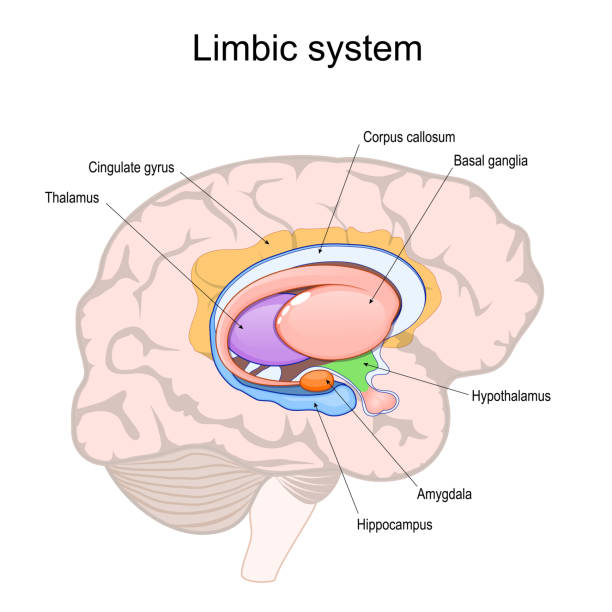
Basal ganglia
Deep within your cerebrum, these structures regulate your movement.
Hippocampus
This small structure in your temporal lobes is responsible for your memory and learning
Thalamus
Sitting above your brainstem, this is the switchboard to your central nervous system. It relays sensory information to your cerebral cortex from the rest of your bod
Hypothalamus
Just below your thalamus, the hypothalamus regulates hormones and autonomic functions like hunger and thirst
Pituitary gland
Below the hypothalamus, the pituitary gland regulates hormone activity
Pineal gland
In the back of your corpus callosum, this gland regulates your sleep and wake cycles.